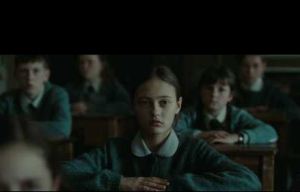Are you feeling a little too happy? Sky too blue, birds too melodious, air too sweet? Never fear, I have the solution for you, a book GUARANTEED to bring you down from those giddy heights!
Kazuo Ishiguro’s Never Let Me Go is an elegantly written book based on a morally repugnant premise, which is hinted at obliquely, and veiled in quotidian details so that the reader is lulled by the seeming normalcy, proceeding on blindly to the ghastly precipice. Too late, the unbearable truth emerged, and I realized that I had been tricked into reading exactly the kind of dire dystopia I try to avoid.
But in fact, Mr. Ishiguro method has always been to gradually and gently lead the reader into the gloom, to start with tiny inconsequential details, but then to keep adding to them in such a way that the whole structure is eventually revealed, and it is NEVER an agreeable one. So WHY do you read his books, Hope? Because he’s so good at what he does, I guess.
As the subject of the book is actually the plot, and revealing the subject reveals the plot, I am placing a lovely picture here, after which I shall tell ALL. If you think you might like to read the book, pray do not read beyond the picture.
The story begins with a banal account of school memories, the silly rivalries, the intense emotion: the narrator’s recollections of her time at Hailsham School. As more details are added the perception of the place as a normal British boarding school starts to sag at the edges—something is wrong, very wrong. There are no parents ever mentioned, and some of the customs seem very strange. Gradually, through subtle hints and suggestions we learn that these children are all clones, bred to be organ donors. Ishiguro has invented a terrible euphemism for the death that awaits each one of these children: “completion”. As in, “I heard that Ruth had completed after her second donation.” There is never the slightest hint that there could be any other future for them, and none of them ever questions it. The adults that run the school are troubled, even tormented, by what they are enabling—but they can’t change it, they can only try and ignore it.
The author does not make any philosophical or moral observations, and has no interest in the nuts and bolts of the science involved. He is telling a story as it might be told by someone living in that world–the narrator’s bland acceptance of her friends’ deaths and her own soon to come is shocking to the reader but obviously commonplace to her and her friends. At only one point is there some discussion about the outside world and its harsh treatment of these enslaved clones, when the notion of doing away with the powerful benefit they provide to humankind is mentioned, and deemed impossible to forego. For who would say, ‘I will let my child/husband/wife die rather than use the body parts of this clone to save his life’, if there were some chance—ANY chance—of saving the one you love. Would you? Would I? Luckily, we will never have to face that decision—it is ONLY A STORY.
Comment from Cathie
This book is almost unbearably sad and paints a horrible world–one in which the victims acquiesce to their function as cloned organ donors, which makes it even more depressing. But you are slowly let into the reality of the three main protagonists’ lives and by then I, at least, was hooked. Worth reading!
